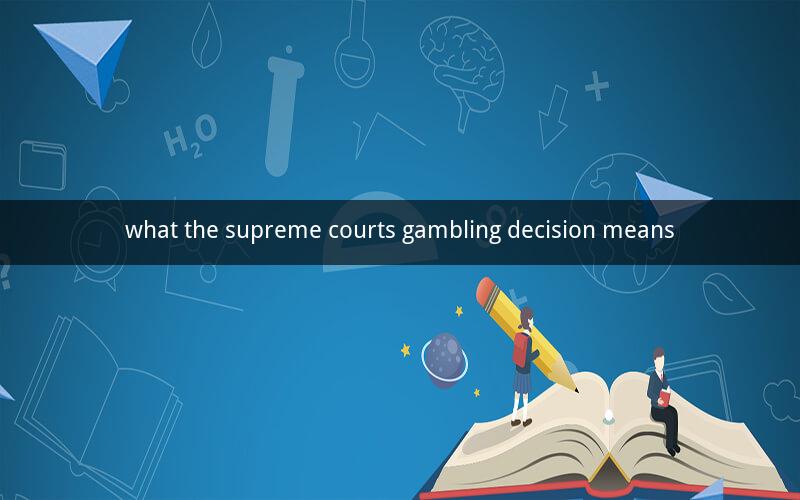
What the Supreme Court's Gambling Decision Means
Table of Contents
1. Introduction to the Supreme Court's Gambling Decision
2. Background of the Decision
3. The Legal Implications
4. Impact on State Governments
5. The Role of the Federal Government
6. Industry Reactions
7. Consumer Implications
8. Challenges and Opportunities for Operators
9. The Broader Legal Landscape
10. Conclusion
1. Introduction to the Supreme Court's Gambling Decision
The Supreme Court's recent decision on gambling has sent shockwaves through the legal and gaming industries. This pivotal ruling has the potential to reshape the landscape of gambling in the United States, impacting everything from state budgets to individual gaming experiences.
2. Background of the Decision
The case in question revolves around the Professional and Amateur Sports Protection Act (PASPA) of 1992, which effectively banned most forms of sports betting outside of Nevada. A group of states challenged the constitutionality of PASPA, arguing that it violated the Tenth Amendment by infringing on states' rights to regulate their own activities.
3. The Legal Implications
The Supreme Court's decision, which struck down PASPA, hinges on the interpretation of the Tenth Amendment. The Court held that PASPA unconstitutionally commandeered state officials to enforce federal law, which is a violation of state sovereignty.
4. Impact on State Governments
With PASPA invalidated, states now have the freedom to regulate sports betting within their borders. This has significant financial implications, as states with newly legalized sports betting could see substantial revenue from taxes on gambling proceeds.
5. The Role of the Federal Government
The federal government's role in this new era of sports betting will be to establish minimum standards and oversee compliance with those standards. However, the extent of federal oversight remains to be seen, as the Court's decision leaves room for state-level regulation.
6. Industry Reactions
The gaming industry has responded positively to the Supreme Court's decision, viewing it as an opportunity for growth and innovation. Operators are now exploring new markets and developing strategies to adapt to the changing regulatory environment.
7. Consumer Implications
Consumers can expect a wider variety of sports betting options, potentially leading to increased competition and better odds. However, there are concerns about the potential for problem gambling and the need for robust regulatory frameworks to protect consumers.
8. Challenges and Opportunities for Operators
Operators face both challenges and opportunities in the wake of the Supreme Court's decision. Challenges include the need to comply with new regulations and the potential for increased competition. Opportunities lie in the potential for new revenue streams and the expansion of their customer base.
9. The Broader Legal Landscape
The Supreme Court's decision on gambling is part of a broader trend towards states asserting their rights and autonomy. This trend could have implications for other areas of law, including healthcare and education.
10. Conclusion
The Supreme Court's gambling decision marks a significant shift in the legal landscape of sports betting in the United States. While the full implications of the ruling are yet to be realized, it is clear that the industry and consumers are poised for a new era of gambling.
---
Questions and Answers
1. Question: How does the Supreme Court's decision impact the gambling industry in states that have not yet legalized sports betting?
Answer: The decision allows states that have not yet legalized sports betting to do so, potentially leading to increased competition and innovation within the industry.
2. Question: What is the expected impact of the decision on state budgets?
Answer: States that legalize sports betting could see significant revenue from taxes on gambling proceeds, which could help fund public services and infrastructure projects.
3. Question: How will the federal government regulate sports betting in states that have legalized it?
Answer: The federal government will establish minimum standards for sports betting, but the extent of oversight remains to be determined.
4. Question: What are the potential challenges for operators in the wake of the decision?
Answer: Operators face challenges such as complying with new regulations, managing increased competition, and ensuring responsible gaming practices.
5. Question: How might the decision affect the overall legal landscape in the United States?
Answer: The decision could lead to a broader trend of states asserting their rights and autonomy in various areas of law.
6. Question: What are the concerns regarding problem gambling in the context of the decision?
Answer: There are concerns that the increased availability of sports betting could lead to higher rates of problem gambling, necessitating robust regulatory frameworks.
7. Question: How will consumers be affected by the decision?
Answer: Consumers can expect a wider variety of sports betting options and potentially better odds, but they should also be aware of the risks associated with gambling.
8. Question: What is the significance of the Tenth Amendment in the context of the decision?
Answer: The Tenth Amendment is significant because it protects states' rights and autonomy, which the Supreme Court cited in its decision to strike down PASPA.
9. Question: How might the decision influence other areas of gambling regulation?
Answer: The decision could set a precedent for other forms of gambling regulation, potentially leading to changes in how other types of gambling are regulated across the country.
10. Question: What is the potential for growth and innovation in the gaming industry following the decision?
Answer: The decision is expected to lead to significant growth and innovation in the gaming industry, as operators explore new markets and develop new products and services.